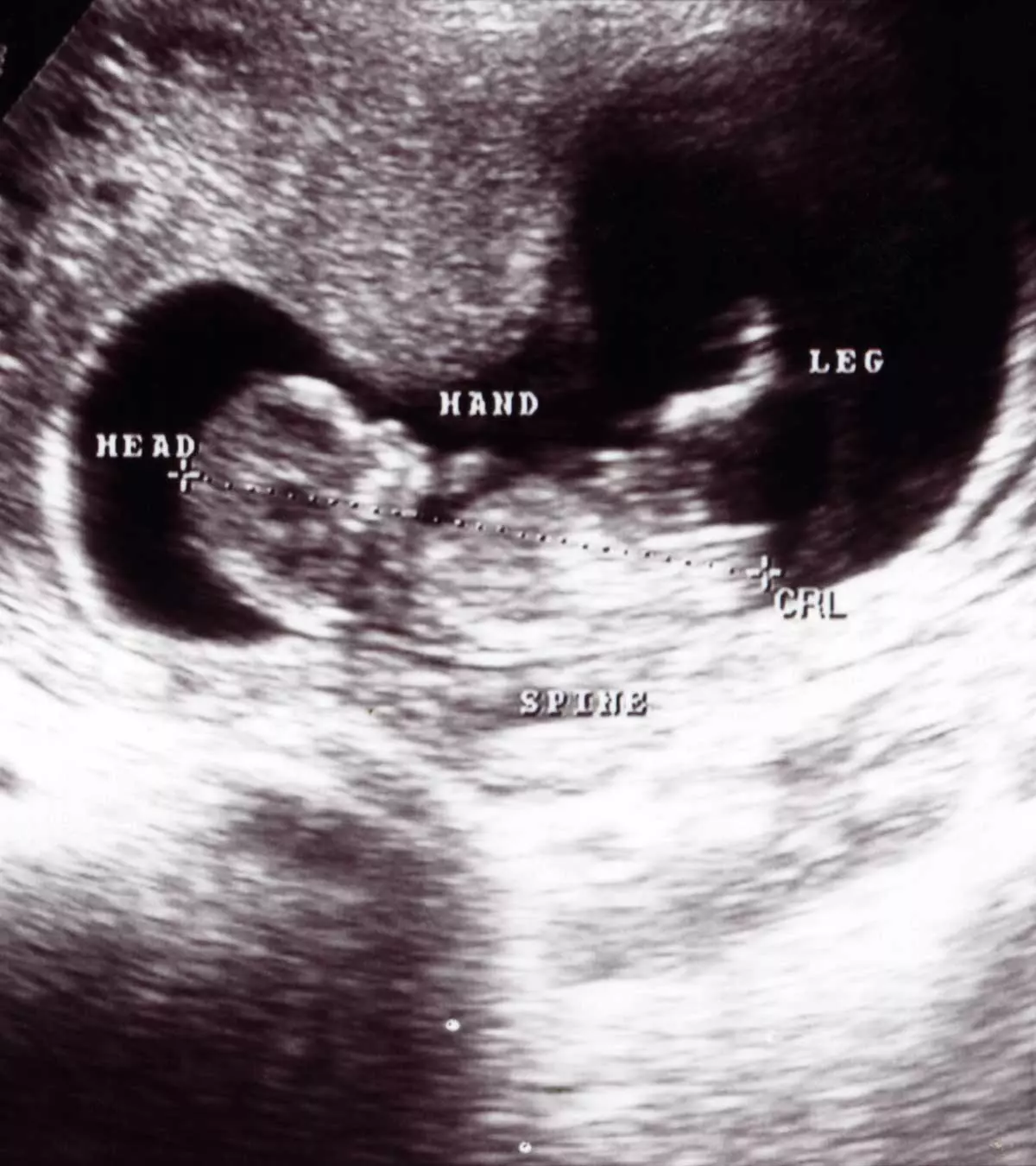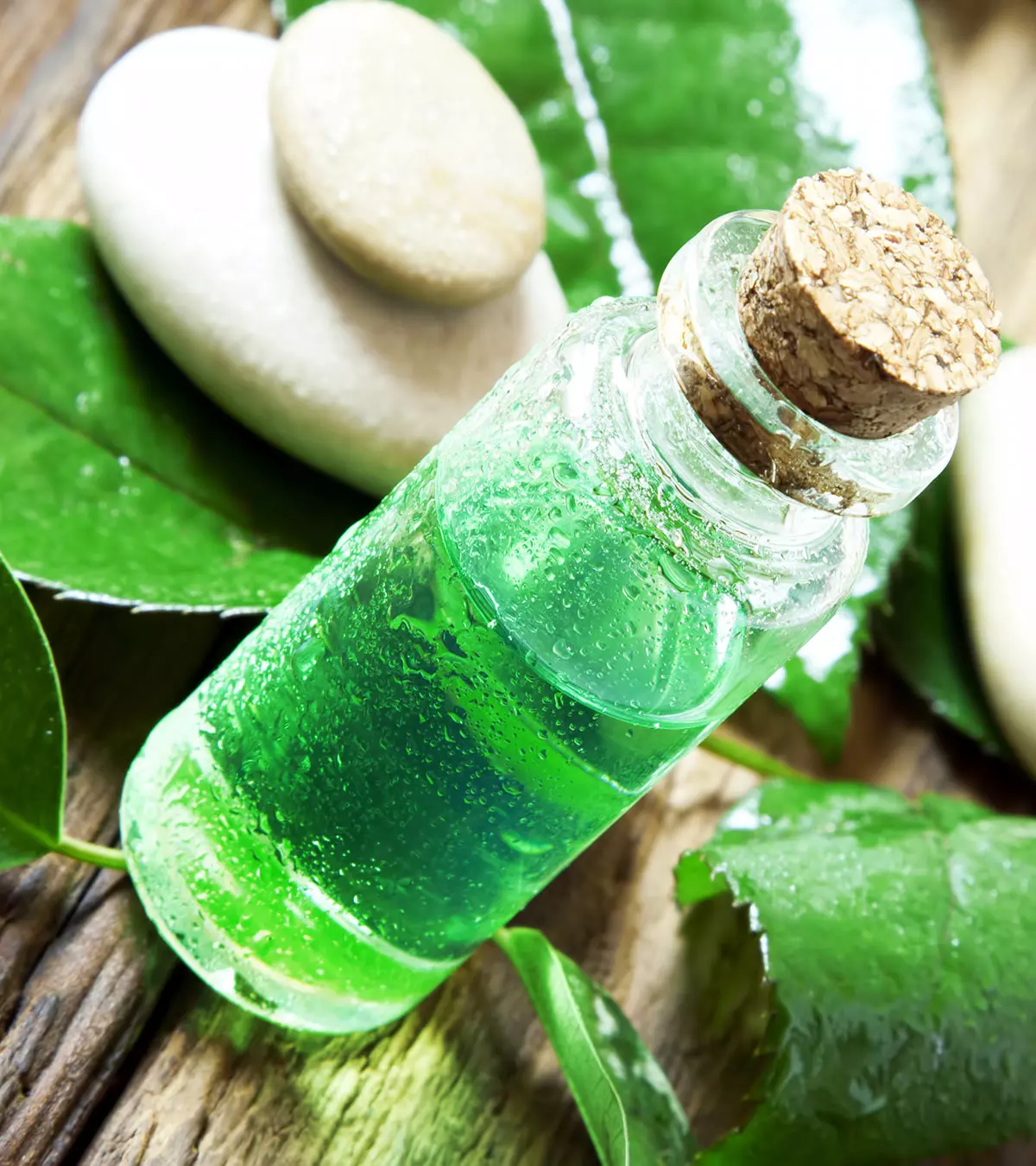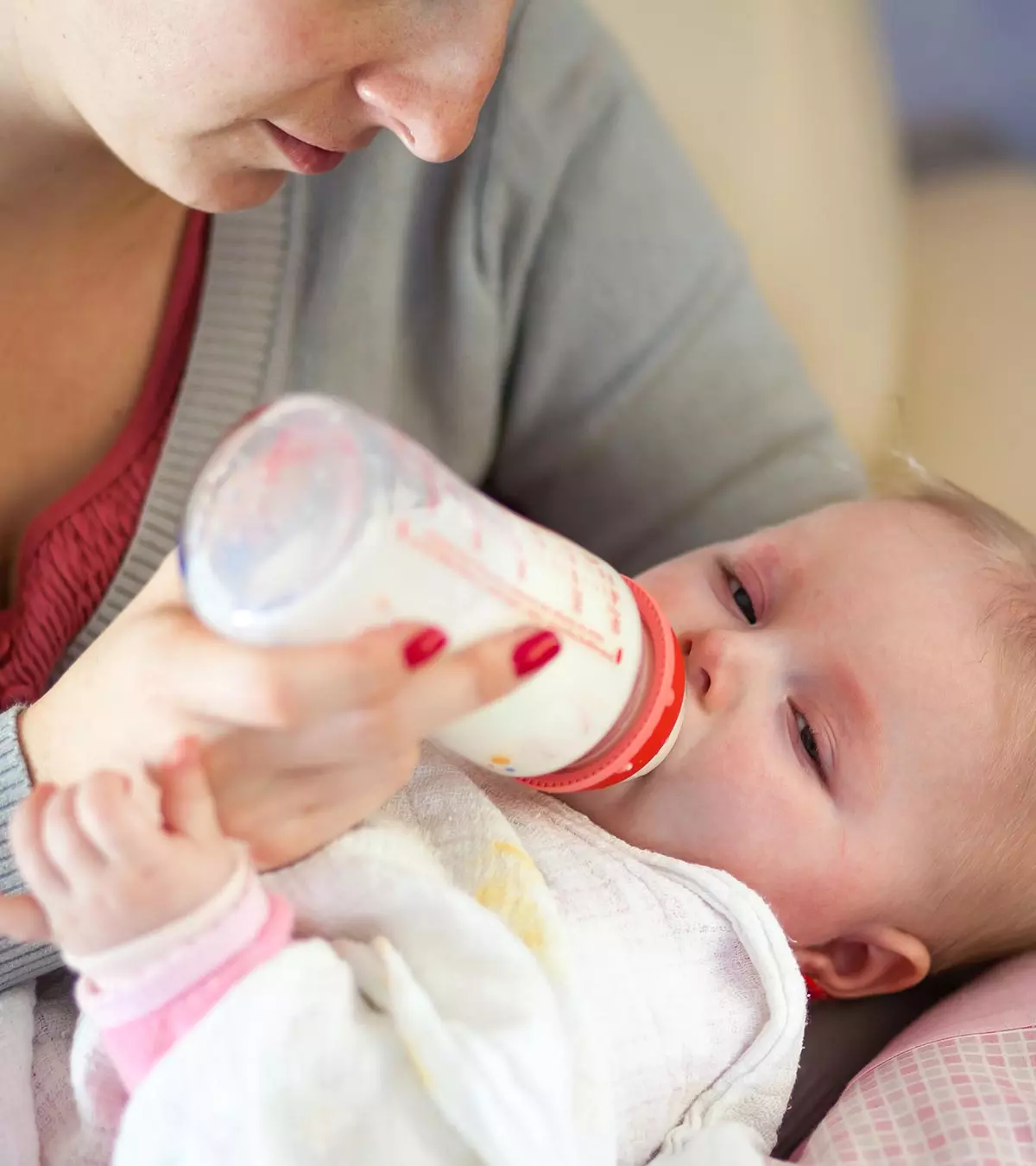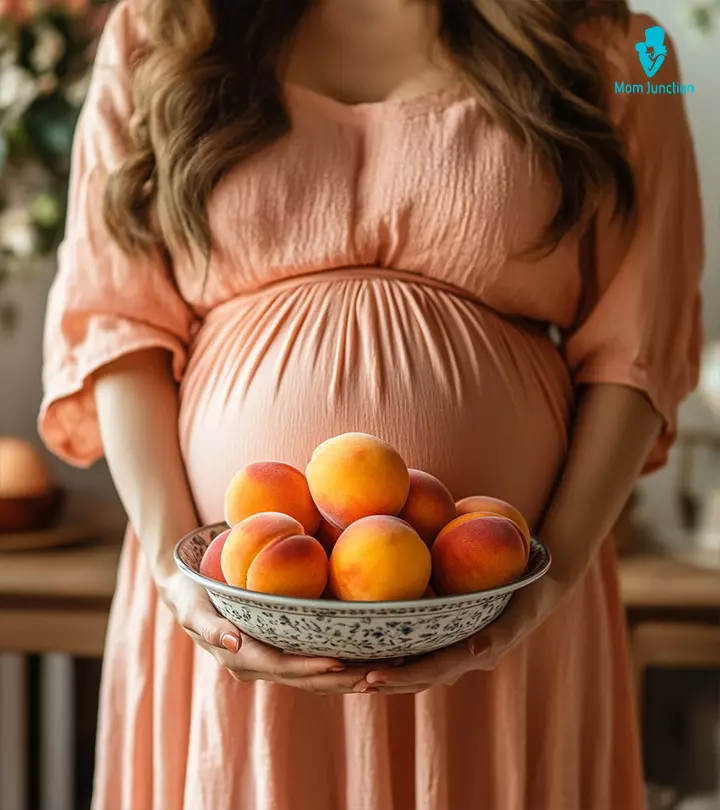
Image: Midjourney/ MomJunction Design Team
It’s hard to imagine something low in calories yet tasty to eat. Of course, we are talking about peaches! Eating peaches during pregnancy can provide essential nutrients, including vitamin C, potassium, and fiber, which support maternal health and fetal development. Peaches are tasty and nutritious fruits that resemble little apples and are a good addition to your pregnancy diet. However, as with most things, they should be consumed in moderation. In this post, we tell you how peach is good for pregnant women, its health benefits, and ways to include it in your diet when expecting.
Key Pointers
- Peaches, whether raw or cooked, are a good source of vitamins, iron, folic acid, protein, fiber, magnesium, and zinc.
- Adding peaches to the pregnancy diet can prevent anemia, gastrointestinal issues, and unhealthy fat, as well as reduce the risk of preterm labor and neural defects in the baby.
- Consuming up to two peaches a day can also help remove bodily toxins and boost bone and muscle growth in the mother and baby.
- Peaches are a healthy snack option during pregnancy as they are low in calories and high in nutrients.
- It is important to choose organic, firm, red-and-yellow-hued, and pesticide-free peaches for safe consumption during pregnancy.
Is It Safe To Eat Peaches During Pregnancy?
Australia-based registered dietitian Amie Alexander says, “Pregnant women can safely consume peaches daily but in moderation. Peaches are rich in nutrients like vitamin C, potassium, beta-carotene, and fiber, which benefit both mom and baby. They can help support immune function, ease pregnancy discomforts like constipation and morning sickness, and may even help reduce the risk of preterm labor due to their vitamin C content.”
Eating the whole fruit as a part of a prenatal care diet is healthy. Wash the peaches well and eat them fresh or cooked in a recipe.
 Did you know?
Did you know?Nutritional Value Of Peaches
One medium sized nutrient-dense peach fruit (about 147 grams) provides you with the following nutrients (1):
- Carbohydrates – 14.8g
- Protein – 1.34g
- Fat – 0.397g
- Fiber – 2.2g
- Vitamin C – 6.03mg
- Vitamin A – 35.3µg
- Potassium – 179mg
- Magnesium – 11.8mg
- Iron – 0.5mg
Benefits Of Eating Peaches During Pregnancy
Peaches are natural sugar sources high in antioxidants, vitamins and minerals, which are vital for you and your growing fetus. Here are some of the nutritional benefits of eating peaches during pregnancy (2):
1. Vitamin C
Peaches are super rich in vitamin C, which is essential for the formation of the baby’s bones, teeth, muscles, cartilage, and blood vessels. 100 grams of peach fruit gives you 6.6 milligrams of this vitamin.
Vitamin C helps in easy absorption of iron into your body, helping you prevent anemiaiA condition characterized by low levels of blood cells or hemoglobin in the body. . Moreover, it also helps boost your immune system and reduce those stretch marks. You can also mitigate the chances of preterm laboriLabor starting between 20-37 weeks of pregnancy, which may result in early childbirth. (3).
2. Folic acid
100 grams of peach fruit gives around four micrograms of folic acid.
Folic acid is an essential nutrient during your first trimester. It helps in the baby’s brain and spine development and prevents the fetus from neural tube defectsiBirth defects of the brain, spine, or spinal cord that usually happen during early pregnancy. like spina bifidaiA congenital disorder where the spinal cord doesn't fully develop, leading to physical and neurological complications. (4).
3. Potassium
Peaches contain potassium, which helps you deal with everyday pregnancy woes. It minimizes uneasiness like fatigue, lightheadedness, anxiety, leg cramps, and swollen ankles, and feet, which are common during pregnancy. Therefore, eating peaches during pregnancy can help both the mother and the baby maintain fluid balance.
4. Fiber
Peaches are a good source of dietary fiber, offering around 1.5 grams per 100 grams of fruit. It, therefore, helps you keep the fiber content optimal during pregnancy by dealing with constipation, indigestion, and other gastrointestinal issues (5). Having a high fiber peach every day will help in regular bowel movements.
5. Natural detox
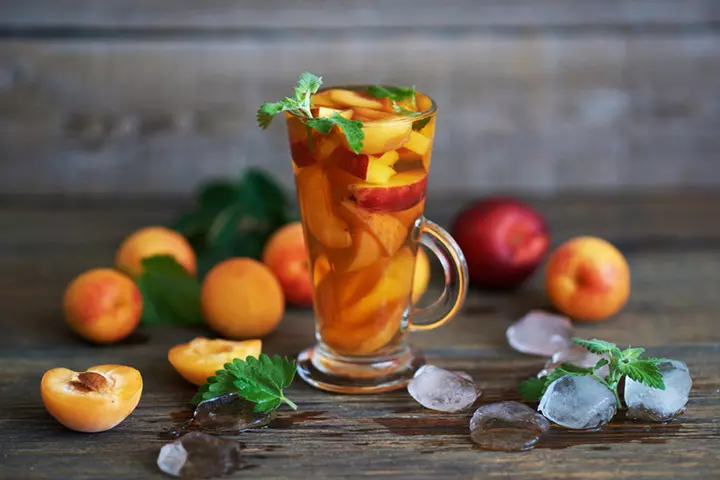
Peaches are natural detoxifying agents. While cleaning up your stomach and intestines, peaches also flush out unwanted toxins and waste from other organs such as liver, kidney, and spleen. What’s more, they also keep your heart functioning better. This detoxification factor of peaches is even helpful in washing the detrimental effects of air pollutants on the mother and the baby if eaten during pregnancy, as shown in a 2011 study conducted on 2,644 pregnant women (6).
6. Beta-carotene
Peaches are a natural source of this wonder vitamin., a precursor of vitamin A. The Wrocław University of Environmental and Life Sciences in Poland conducted a research to quantitatively analyze carotenoids in peaches. The study revealed that beta-carotene was the most abundant carotenoid in peaches, accounting for an average of 88% of the total carotenoid content (7). Eating peaches helps you fill up your body with healthy levels of beta caroteneiA colored pigment and vitamin A precursor found in fruits and vegetables conferring several benefits. . Beta carotene helps boost the immune system of your body and your baby.
7. Reduce baby weight
Peaches also help you post delivery by helping you lose all that baby weight. The low calorie and high nutrient peaches help you get rid of unwanted fat, without extra weight gain and regulate the functioning of your body (8).
8. Phosphorus
The recommended daily allowance of phosphorus during pregnancy is 700 milligrams, and 100 grams of peach fruit provides 20 mg of this nutrient. It helps build strong bones in both the mother and growing baby (9).
9. Magnesium
Peaches contain a considerable amount of magnesium, which helps prevent premature contractionsiPeriodic and timed tightening of the uterine muscles during labor, facilitating the childbirth process. of the uterus and wards off leg cramps and constipation during pregnancy (10).
10. Antiemetic property
The antiemetic property of peaches helps relieve morning sickness (11). You may consume peach tea to avoid vomiting.
During her pregnancy, Natalie Vickery, a mother and a herbalist discovered a remedy for morning sickness in peaches. She explains, “When I was pregnant with my son I craved peaches and nectarines. I never thought much about those cravings until a few years later when I was reading a book called ‘Mountain Medicine’ by herbalist Darryl Patton, which (prescribed peach leaf tea for morning sickness). I believe now that those cravings for peach were my body’s way of intuitively recommending a remedy for my morning sickness (i).”
Thus, peaches do all the good you want during pregnancy. But you cannot eat them the way you want.
Pesticide Concerns And Organic Options
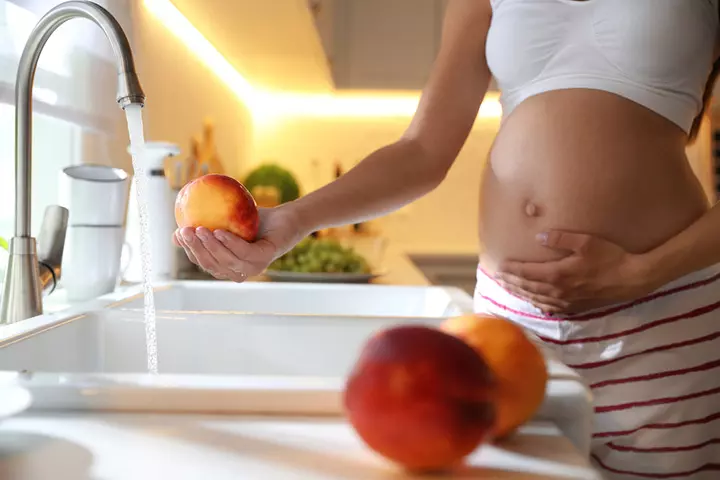
A big concern in eating peaches is the high amount of pesticides present in them. The tests conducted by the US Department of Agriculture in 2008 showed that there were more than 50 pesticide residues on imported and domestic peaches. It also revealed that peaches are one of the 12 most pesticide-contaminated fruits (12). Therefore, buy organic peaches to rule out any fears.
Even if you are buying organic fruits, you need to be careful about other negative impacts.
How Much Peach Fruit Can A Pregnant Woman Have?
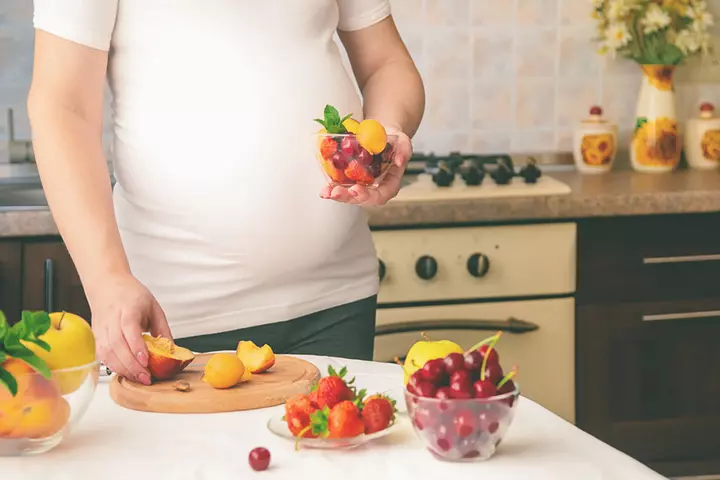
During pregnancy, you need to eat all food in moderation. You should not consume more than 500 grams of peach a day. UNICEF encourages pregnant women to eat four to five cups of fruits and vegetables every day all throughout the pregnancy (13). You can try to limit yourself to two peaches a day along with other fruits and veggies.
But you can benefit from the fruit only if you are buying the right peaches.
How To Choose Peaches?
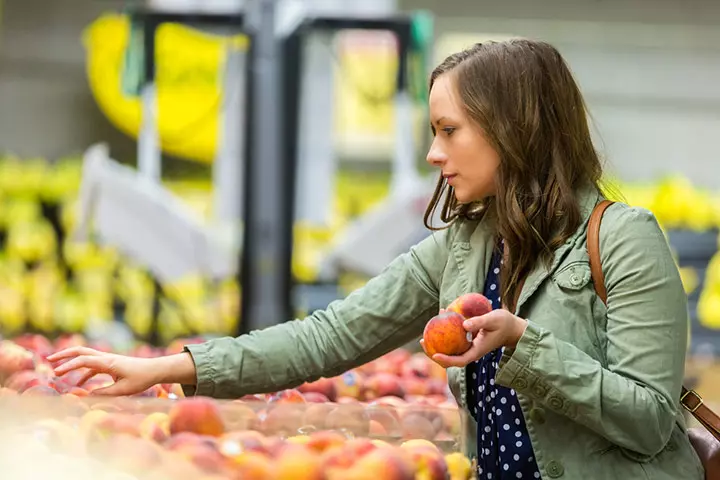
Registered pharmacist and nutritionist Sarah Gray says, “Take care when buying bagged or pre-washed peaches, as they can occasionally be linked to listeria outbreaks. Listeria can be harmful during pregnancy. Choose fresh peaches and wash them thoroughly before eating.”
Here are a few more precautions to keep in mind:
- The fruit should be fairly firm. The skin hue between the red areas should be yellow or creamy.
- It should not be hard or very firm with a distinct green hue, which means it is unripe.
- It should not be overripe too.
- Peaches should not have large flattened bruises or any other signs of decay.
 Things to know
Things to knowSo, you understood the goodness of peaches and bought the right peaches. What do you do now?
How To Include Peach In Your Pregnancy Diet?
Washington-based registered dietitian Alicia Chacha Miller says, “During pregnancy, you can enjoy peaches in all their forms, whether fresh, frozen, or canned. If opting for canned, it is generally recommended to choose ones packed in water or 100% juice instead of syrup to minimize added sugars.”
Peaches are usually available from May to November and fall under two categories – Freestones, which can be eaten fresh as well as frozen, while Clingstones are useful for canning and sometimes sold fresh.
- Slice the fruit and add it to hot or cold cereal as a morning meal, or include it as a dessert.
- Include peaches in healthy snacks such as fruit kebabs. Take a wooden skewer, thread a chunk of peach, rockmelon, watermelon, grape and any fruit of your choice.
- Prepare a smoothie with peeled peach, banana, a chunk of pineapple and ice cubes. Blend them until you get a smooth consistency.
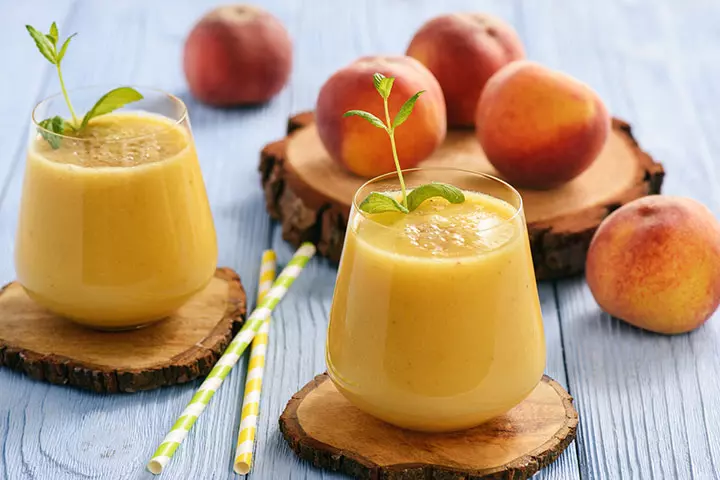
- Grill peaches when you plan to have a barbecue. Cut the fruit in half, deseed, brush with a light oil like canola and grill over a medium heat until it turns tender. You can have it along with a scoop of yogurt.
- If you have never consumed peaches before, you should introduce them gradually and monitor for any adverse reactions.
Explaining the reason behind choosing fresh peaches over canned peaches during pregnancy, a registered dietician, Maxine Smith, RDN, LD, says, “Fresh peaches tend to be higher in antioxidants than their canned counterparts; canned peaches are often peeled, which is a missed opportunity because the soft, fuzzy skin is where a lot of antioxidants are found” (14).
Frequently Asked Questions
1. Can peaches lead to miscarriage?
In some cultures, it is believed that eating peaches can cause a miscarriage (16). However, no clinical studies or trials support this assumption.
2. Why am I craving peaches while pregnant?
According to experts, food cravings, such as those for peaches, may happen due to hormonal changes, heightened smell and taste, or nutritional deficiencies (17). However, no specific link has been established between food cravings and their said trigger (18). Thus, no specific reason exists for peach cravings during pregnancy.
3. Can peach juice provide the same benefits as eating whole peaches during pregnancy?
Peach juice does not offer the same benefits as whole peaches. Whole peach fruit contains soluble and insoluble fiber, which is absent in peach juice, especially if the juice is strained. In addition, the juicing process can lead to the loss of essential nutrients like vitamin C, which is present in significant amounts in whole peaches. Moreover, the fiber in whole peaches helps slow down sugar absorption into the bloodstream, leading to more stable blood sugar levels. Conversely, peach juice, which lacks fiber, can cause a more rapid increase in blood sugar levels due to its concentrated sugar content.
4. Are there any risks associated with consuming too many peaches during pregnancy?
A moderate consumption of fruit is recommended during pregnancy as it is a good source of nutrients, fiber, vitamins and minerals. However, according to a study overconsumption of fruit during the second trimester of pregnancy may increase the risk of gestational diabetes mellitus. This was particularly observed in the case of over consumption of tropical fruit and citrus fruits that possess a high glycemic index (19).
5. How do I wash peaches to reduce pesticide exposure?
To reduce pesticide exposure, wash peaches thoroughly under running water. Another approach is to soak them in water, gently scrub, peel the skin with your hands, use a soft brush, and rinse well to remove any residues (20).
6. What are the potential adverse effects of eating peaches during pregnancy?
Peaches are a nutritious fruit to include in a pregnancy diet. However, it may help to know that people with pollen allergy might also be allergic to pears, and therefore, it is best avoided. Some of the symptoms you may notice in the case of peach allergy after a few minutes of consumption include itching and swelling of the mouth and throat, abdominal pain, and vomiting. Peach allergy is more common when eating raw peaches. Therefore, it is recommended to eat cooked peaches during pregnancy (21).
Peaches are loaded with nutrients like vitamin C, folic acid, and potassium, making them one of the best fruits to eat during pregnancy. The fruit helps prevent anemia, leg cramps, morning sickness, and flushes out extra toxins. You may safely add peach during pregnancy to your diet for its great health benefits. However, consume it in moderate amounts, as an excess of anything may cause harm. Always choose organic varieties to stay away from pesticides. Buy fruits that are fresh and firm rather than overripe. If you are unsure of their safety, discuss your concerns with your doctor.
Infographic: Advantages Of Eating Peaches During Pregnancy
Peaches are soft and juicy fruits that belong to the Rose family. Loaded with vitamins and minerals that are good for fetal growth and development, these fruits also benefit the expectant mother. So, check out the infographic below to learn several benefits of eating peaches when pregnant. Illustration: Momjunction Design Team
Illustration: Is It Safe To Eat Peaches During Pregnancy?
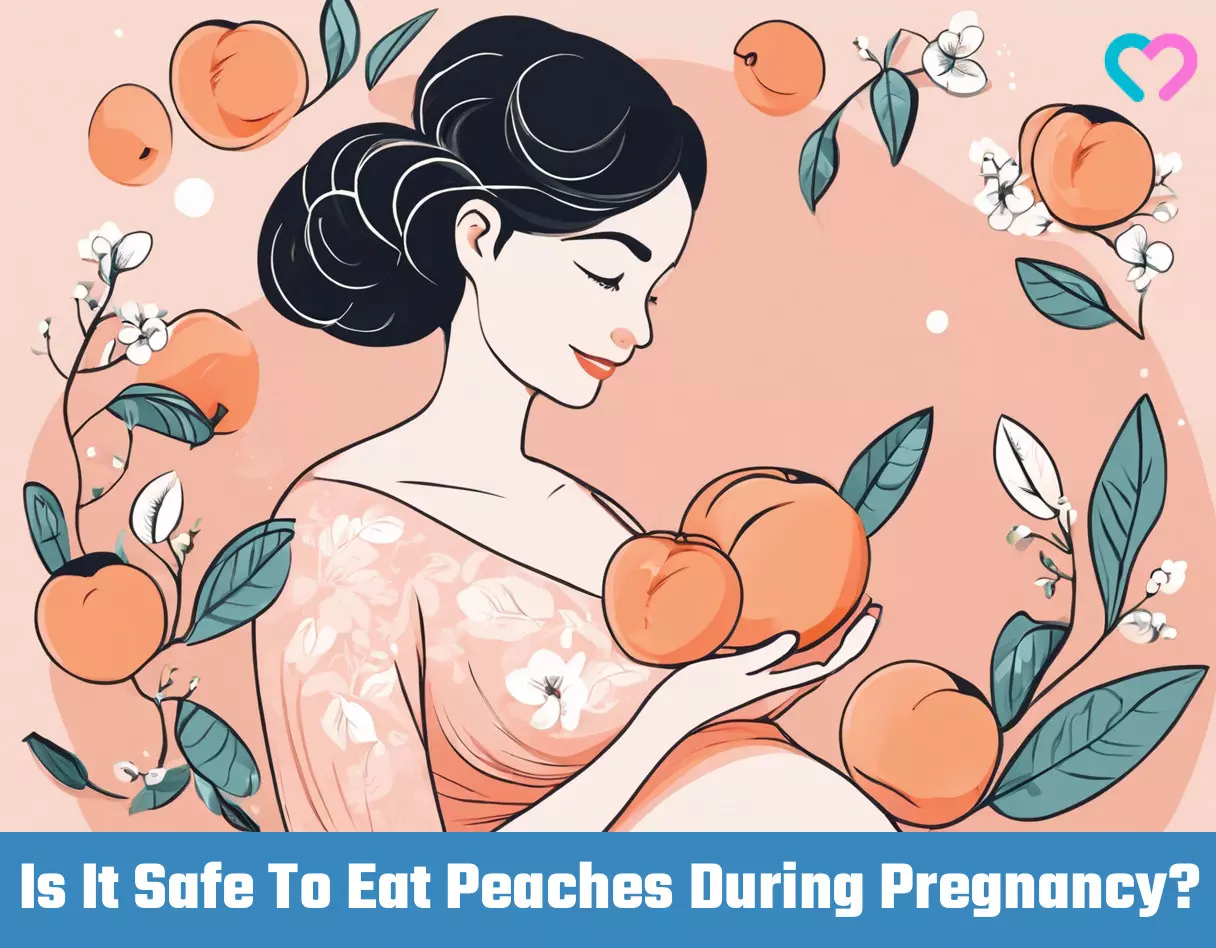
Image: Stable Diffusion/MomJunction Design Team
Personal Experience: Source
MomJunction articles include first-hand experiences to provide you with better insights through real-life narratives. Here are the sources of personal accounts referenced in this article.
i. Peach medicine;https://thefamilyherbalist.wordpress.com/2012/09/24/peach-medicine/
References
- Peaches yellow raw
https://fdc.nal.usda.gov/fdc-app.html#/food-details/325430/nutrients - Pick Peaches for Healthy Nutrients.
https://www.nutritionletter.tufts.edu/general-nutrition/pick-peaches-for-healthy-nutrients/ - Nayereh Ghomian et al. (2013); The Role of Vitamin C in Prevention of Preterm Premature Rupture of Membranes.
https://www.ncbi.nlm.nih.gov/pmc/articles/PMC3652497/ - About Folic Acid
https://www.cdc.gov/folic-acid/about/?CDC_AAref_Val=https://www.cdc.gov/ncbddd/folicacid/about.html - Johanna Kristiina Reijonen et al.; (2022); Association of dietary fiber liquid intake and lifestyle characteristics with gastrointestinal symptoms and pregnancy outcome.
https://pmc.ncbi.nlm.nih.gov/articles/PMC9614560 - Mònica Guxens et al.; (2011); Prenatal Exposure to Residential Air Pollution and Infant Mental Development: Modulation by Antioxidants and Detoxification Factors.
https://pmc.ncbi.nlm.nih.gov/articles/PMC10039266/ - Paulina Nowicka et al.; (2023); Quantitative and qualitative determination of carotenoids and polyphenolics compounds in selected cultivars of Prunus persica L. and their ability to in vitro inhibit lipoxygenase cholinoesterase α-amylase α-glucosidase and pancreatic lipase.
https://pmc.ncbi.nlm.nih.gov/articles/PMC10039266/ - Healthy Habits: Fruits and Vegetables to Manage Weight
https://www.cdc.gov/healthy-weight-growth/healthy-eating/fruits-vegetables.html - Denise HM Heppe et al.; (2013); Maternal first-trimester diet and childhood bone mass: the Generation R.
https://www.sciencedirect.com/science/article/pii/S0002916523051511?via%3Dihub - Maria Makrides et al.; (2014); Magnesium supplementation in pregnancy.
https://pmc.ncbi.nlm.nih.gov/articles/PMC6507506/ - Peach (Prunus Persica)
https://www.holisticlivingschool.org/2021/04/01/peach-plant-of-the-month-april/ - Pesticide Data Program Annual Summary Calendar Year 2008
https://www.ams.usda.gov/sites/default/files/media/2008%20PDP%20Annual%20Summary.pdf - What to eat before during and after pregnancy.
https://www.unicef.org/rosa/stories/what-eat-during-and-after-pregnancy - All the Health Benefits of Eating Peaches.
https://health.clevelandclinic.org/benefits-of-peaches - Peaches.
https://www.chhs.colostate.edu/fsi/food-articles/produce/peaches/ - Mmbulaheni Ramulondi et al.; (2021); Traditional food taboos and practices during pregnancy postpartum recovery and infant care of Zulu women in northern KwaZulu-Natal
https://www.ncbi.nlm.nih.gov/pmc/articles/PMC7981893/ - Why Pregnancy Can Make You Have Weird Cravings
https://intermountainhealthcare.org/blogs/why-pregnancy-can-make-you-have-weird-cravings - Food cravings during pregnancy
https://www.pregnancybirthbaby.org.au/food-cravings-during-pregnancy - Wu-Qing Huang et al.; (2017); Excessive fruit consumption during the second trimester is associated with increased likelihood of gestational diabetes mellitus: a prospective study
https://www.ncbi.nlm.nih.gov/pmc/articles/PMC5341573/ - How can I wash pesticides from fruit and veggies?
http://npic.orst.edu/capro/fruitwash.html - Allergy information for: Peach (Prunus persica).
http://research.bmh.manchester.ac.uk/informall/allergenic-food/index.aspx?FoodId=37
Community Experiences
Join the conversation and become a part of our nurturing community! Share your stories, experiences, and insights to connect with fellow parents.
Read full bio of Jyoti Benjamin
- Amie Alexander is a Registered Dietitian with over 15 years of experience. They hold a Master’s degree in Nutrition and Dietetics from the University of Sydney. They started their career as a Dietetic Intern at HealthShare NSW and gained clinical experience at Plena Healthcare. Amie then worked for over eight years at LifeFusion Consulting, offering personalized dietary advice. Amie currently serves as the Head of Product at Nutri Peak, where they combine their passion for fitness with their extensive expertise in nutrition. Since joining Nutri Peak in May 2024, they have led the development of high-quality nutritional products, such as protein powders and pre-workout formulas, that support diverse fitness goals. Amie remains committed to helping individuals achieve optimal health through science-based, effective nutritional strategies.
 Amie Alexander is a Registered Dietitian with over 15 years of experience. They hold a Master’s degree in Nutrition and Dietetics from the University of Sydney. They started their career as a Dietetic Intern at HealthShare NSW and gained clinical experience at Plena Healthcare. Amie then worked for over eight years at LifeFusion Consulting, offering personalized dietary advice. Amie currently serves as the Head of Product at Nutri Peak, where they combine their passion for fitness with their extensive expertise in nutrition. Since joining Nutri Peak in May 2024, they have led the development of high-quality nutritional products, such as protein powders and pre-workout formulas, that support diverse fitness goals. Amie remains committed to helping individuals achieve optimal health through science-based, effective nutritional strategies.
Amie Alexander is a Registered Dietitian with over 15 years of experience. They hold a Master’s degree in Nutrition and Dietetics from the University of Sydney. They started their career as a Dietetic Intern at HealthShare NSW and gained clinical experience at Plena Healthcare. Amie then worked for over eight years at LifeFusion Consulting, offering personalized dietary advice. Amie currently serves as the Head of Product at Nutri Peak, where they combine their passion for fitness with their extensive expertise in nutrition. Since joining Nutri Peak in May 2024, they have led the development of high-quality nutritional products, such as protein powders and pre-workout formulas, that support diverse fitness goals. Amie remains committed to helping individuals achieve optimal health through science-based, effective nutritional strategies. - Alicia Chacha Miller is a registered dietitian specializing in maternal and pediatric nutrition. She holds an MS in Nutrition Science from the University of Southern California and founded Cardamom Nutrition.
 Alicia Chacha Miller is a registered dietitian specializing in maternal and pediatric nutrition. She holds an MS in Nutrition Science from the University of Southern California and founded Cardamom Nutrition.
Alicia Chacha Miller is a registered dietitian specializing in maternal and pediatric nutrition. She holds an MS in Nutrition Science from the University of Southern California and founded Cardamom Nutrition. - Amanda Wahlstedt is a registered dietitian specializing in functional women’s health. She received her Bachelor of Science from Cornell University and Master of Science in Nutrition and Public Health from Columbia University. With seven years in the industry, she now owns the private practice Roots to Leaves.
 Amanda Wahlstedt is a registered dietitian specializing in functional women’s health. She received her Bachelor of Science from Cornell University and Master of Science in Nutrition and Public Health from Columbia University. With seven years in the industry, she now owns the private practice Roots to Leaves.
Amanda Wahlstedt is a registered dietitian specializing in functional women’s health. She received her Bachelor of Science from Cornell University and Master of Science in Nutrition and Public Health from Columbia University. With seven years in the industry, she now owns the private practice Roots to Leaves.
Read full bio of Swati Patwal
Read full bio of Rebecca Malachi
Read full bio of Aneesha Amonz













